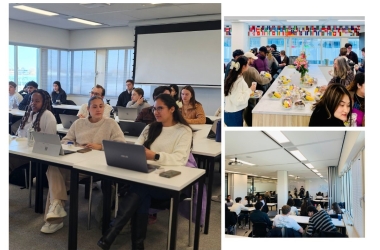Wittenborg Online News!
Wittenborg Hosts Debate on Fair-Trade Policies in the Music Industry
Wittenborg Hosts Debate on Fair-Trade Policies in the Music Industry

Wittenborg Hosts Debate on Fair-Trade Policies in the Music Industry
Debating Fair-Trade Music: Rethinking Artist Compensation and Ethical Consumption
On 19 March, Wittenborg hosted an intercollegiate debate with IES Abroad, to discuss the future of fair-trade policies in the music industry. This conversation has been gaining momentum in recent years, with artists like Taylor Swift and Chapelle Roan leading the charge for fair compensation and better rights for musicians. Led by senior lecturer Amy Abdou, the debate saw participants from diverse backgrounds, including students from New York, Seoul, Morocco, Miami, Vietnam, Türkiye, Albania, Ohio, Russia, Rwanda, Colombia, Belarus and more.
Abdou, who has been organising the bi-annual debates since 2019, led the discussion, with previous topics addressing issues such as child labour in the West African cocoa industry and fair trade in the coffee industry. The themes for these activities are closely tied to courses in Sociology and Organisational Behaviour.
On the day, students divided into teams representing various stakeholders within the music industry: Spotify, musicians, non-creatives, Capitol Records, consumers, and influencers. Their objective was to explore the complexities of fair pay for artists and workers' rights in an age dominated by streaming platforms.

The Spotify Perspective: A Platform for Access and Exposure
The debate kicked off with a team representing Spotify, who argued that streaming platforms are essential for artists to reach broader audiences and gain exposure in a rapidly changing music landscape. “Spotify provides artists with access to millions of potential listeners,” one team member remarked, “and the platform’s reach is unparalleled.”
However, they also acknowledged the challenges that come with streaming, particularly around the financial compensation for artists. Despite these platforms generating billions in revenue, the return for the musicians remains dismal. “While Spotify may not provide fair compensation on its own, it is still the best option available for many artists to get discovered,” they argued. They believed that the solution may not lie in higher subscription costs but in better revenue-sharing models that ensure a fairer distribution of earnings.
The Musicians’ View: A Struggle for Fair Pay
Next, the musicians’ team made their case about the challenges they face in the modern music industry. “Most artists signed to labels will never make it big. 80% of them will never be heard of,” Abdou pointed out. The team stressed how the financial reality of being a musician today is grim, with many struggling to make ends meet despite streaming platforms being integral to their visibility.
The musicians argued that while streaming services like Spotify provide significant exposure, they still fail to deliver substantial financial returns. Abdou also explained how streaming platforms act as “middlemen,” and are profiting greatly while the actual creators – the artists – are left with a fraction of the revenue. “Streaming services are seen as the pariahs in this,” Abdou remarked, emphasising how the platforms and record labels seem to have all the power, leaving artists to rely on alternative income streams like brand deals and live performances.

Non-Creatives: Behind the Scenes but Without Fair Compensation
The next team represented non-creatives – those who work behind the scenes, such as managers, producers, and agents – whose jobs are essential to an artist’s success but who often go underappreciated and underpaid in comparison to the major platforms. “We ensure that everything runs smoothly, from production to promotion,” one team member argued, “but we, too, face the challenge of working within an industry that undervalues everyone except the biggest players.”
The team highlighted how non-creatives often rely on multiple projects or contracts to sustain a living, as the revenue from streaming is not enough to support their roles. “The truth is, it’s a tough world for anyone who’s not a top artist or working for a major label,” they said, urging for better revenue-sharing policies to include all those who contribute to the music ecosystem.
Capitol Records: The Power of Labels and Their Investments
The debate took an interesting turn when the team representing Capitol Records took the stage. They argued that record labels play an essential role in the development of an artist's career, investing both time and money in promotion, legal work, and marketing. “We provide the infrastructure, the team, and the capital to ensure artists can thrive,” one representative explained.
While Capitol acknowledged the underpayment of many artists, they defended the power of streaming platforms and argued that labels, investing heavily in their artists, face challenges too. The team stressed that labels and streaming services must work together to improve compensation for artists, but that this requires substantial shifts in the way the entire industry operates.
The Consumer Perspective: The Dilemma of Ethical Consumption
As the debate moved to the consumer perspective, the discussion shifted towards ethical consumption. Many participants voiced concern about whether consumers are willing to pay more for ethical music consumption. “Consumers aren’t willing to pay more,” one team member noted, referencing how streaming services like Spotify and Apple Music are already seen as expensive for the average listener.
The students acknowledged that while consumers hold some responsibility, it should not fall entirely on their shoulders to fix the industry. Instead, they suggested that streaming platforms should take the lead in addressing these issues and ensure that the people creating the music get compensated fairly. “Consumers should take responsibility in demanding ethical music consumption, but platforms should lead the way with fair payment models,” one participant suggested.
Influencers: The Unsung Heroes of Music Promotion?
Finally, the team representing influencers made a compelling case about the power they wield in the music industry. “Influencers are driving new listeners to Spotify and helping songs go viral, especially on platforms like TikTok,” one participant noted. The team argued that influencers often play a crucial role in the success of songs, but despite their efforts, they receive little to no financial reward. “Influencers do the work, but the biggest profits go to the platforms,” Abdou pointed out, highlighting the imbalance in how revenue is distributed.
The Struggle for Fair Compensation: A Path Forward
The debate culminated in a final push for a fairer system of compensation for all parties involved. A significant part of the discussion centred around whether consumers are willing to pay more for their subscriptions to support fair-trade music. While some students argued that consumers would not accept higher costs, others suggested that ethical consumption might require just that. “If we commit to fair-trade music, we know subscription costs may rise, but it’s a necessary step for long-term change,” Abdou said.
WUP 14/04/2025
by Erene Roux
©WUAS Press
1094 words